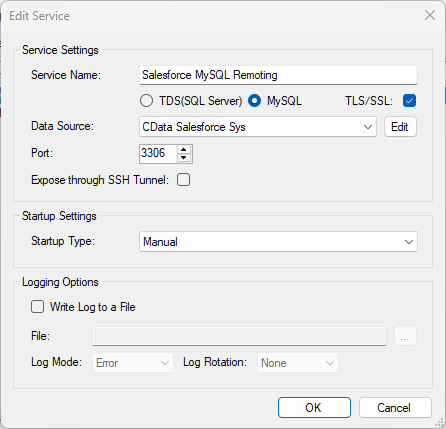Discover how a bimodal integration strategy can address the major data management challenges facing your organization today.
Get the Report →Query Confluence Data as a MySQL Database in Node.js
Execute MySQL queries against Confluence data from Node.js.
You can use the SQL Gateway from the ODBC Driver for Confluence to query Confluence data through a MySQL interface. Follow the procedure below to start the MySQL remoting service of the SQL Gateway and start querying using Node.js.
Connect to Confluence Data
If you have not already done so, provide values for the required connection properties in the data source name (DSN). You can use the built-in Microsoft ODBC Data Source Administrator to configure the DSN. This is also the last step of the driver installation. See the "Getting Started" chapter in the help documentation for a guide to using the Microsoft ODBC Data Source Administrator to create and configure a DSN.
Obtaining an API Token
An API token is necessary for account authentication. To generate one, login to your Atlassian account and navigate to API tokens > Create API token. The generated token will be displayed.
Connect Using a Confluence Cloud Account
To connect to a Cloud account, provide the following (Note: Password has been deprecated for connecting to a Cloud Account and is now used only to connect to a Server Instance.):
- User: The user which will be used to authenticate with the Confluence server.
- APIToken: The API Token associated with the currently authenticated user.
- Url: The URL associated with your JIRA endpoint. For example, https://yoursitename.atlassian.net.
Connect Using a Confluence Server Instance
To connect to a Server instance, provide the following:
- User: The user which will be used to authenticate with the Confluence instance.
- Password: The password which will be used to authenticate with the Confluence server.
- Url: The URL associated with your JIRA endpoint. For example, https://yoursitename.atlassian.net.
Configure the SQL Gateway
See the SQL Gateway Overview to set up connectivity to Confluence data as a virtual MySQL database. You will configure a MySQL remoting service that listens for MySQL requests from clients. The service can be configured in the SQL Gateway UI.

Query Confluence from Node.js
The following example shows how to define a connection and execute queries to Confluence with the mysql module. You will need the following information:
- Host name or address, and port: The machine and port where the MySQL remoting service is listening for MySQL connections.
- Username and password: The username and password of a user you authorized on the Users tab of the SQL Gateway.
- Database name: The DSN you configured for the MySQL remoting service.
Connect to Confluence data and start executing queries with the code below:
var mysql = require('mysql');
var connection = mysql.createConnection({
host : 'localhost',
database : 'CData Confluence Sys',
port : '3306',
user : 'mysql_user',
password : 'test'
});
connection.connect();
connection.query('SELECT * FROM Pages', function(err, rows, fields) {
if (err) throw err;
console.log(rows);
});
connection.end();






